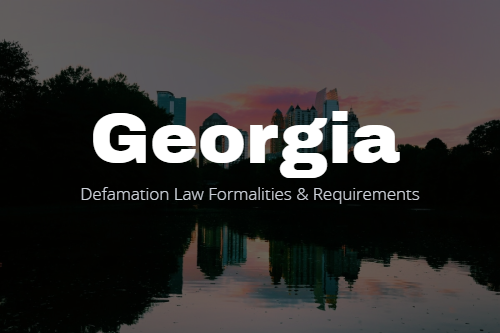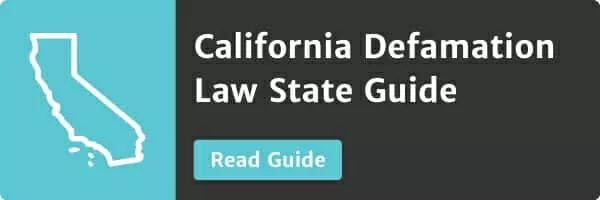
- Originally Published on July 5, 2018
The Minc Law Guide to Georgia Defamation Law
What is Defamation? How Does Georgia Define Defamation?
The tort of defamation is an all-encompassing legal term which governs the written or spoken act of communicating a false assertion of fact to a third-party, which subsequently harms or injures a person’s reputation.This comprehensive blog post will address Georgia defamation law and everything that is essential for both Georgia defamation plaintiffs and defendants.
Defamation may commonly be referred to as “defamation of character,” and is classified as a civil wrong in the United States and other Common Law jurisdictions, such as Canada, Australia, and the United Kingdom – as the tort of defamation is a civil wrong, it allows defamed and injured parties to recover damages.
Breaking down the definition of defamation even further, it may be divided into two core types:
- Slander: the spoken/oral communication of a false assertion of fact, communicated to a third-party, which harms or damages another person’s reputation.
- Libel: the written or published (pictures, video, & other media) statement of a false assertion of fact, communicated to a third-party, which harms or damages another person’s reputation.
Understanding the form in which the tort of defamation is conveyed is extremely important, as most states make clear distinctions between libel and slander, and it can ultimately have an affect on important procedural and filing requirements when bringing a claim. The general public typically uses ‘slander’ as a catch-all term for defamation, when in reality, they are two different actions. For example, as libel is generally easier to prove – after all, there’s written or published evidence – most U.S. states require plaintiffs to bring slander claims before libel claims.
It bears repeating, before bringing a defamation claim, make sure you look to the form in which the false assertion of fact or statement was communicated. In order to help you remember which is which, let’s look to the Latin term for ‘libel’ – ‘libellus’ – which literally means ‘small book’. So, if you have been defamed in a written publication or other tangible medium, think of it as being published in a ‘small book’, or ‘libellus’.
And, with society’s increasing use of social media and the Internet, libel cases are becoming the norm in the defamation law litigation arena – so make sure you preserve all available evidence by either screenshotting or taking a picture of it.
Some other common names for defamation include:
- Calumny,
- Vilification,
- Character assassination,
- Traducement, &
- Disparagement.
However, note that the term ‘disparagement’ is actually a misnomer, as it addresses derogatory statements that are adverse to a business’s property, title, or finances. Disparagement is typically referred to as the tort of commercial or business disparagement, and aims to protecting a business or company’s rights, rather than an individual’s reputation.
If you’d like to read up further on commercial disparagement and how it differs from defamation, check out our comprehensive blog post titled, “What is Business/Commercial Disparagement?” It also addresses the necessary elements for a successful disparagement claim, veggie libel laws, popular defenses to a disparagement suit, and how to hold persons liable for commercial disparagement.
So, what do you call people who defame other persons?
The most common names for persons who defame other parties are:
- Libelers: for written communications and publications of false assertions of fact,
- Slanderers: for spoken communications and publications,
- Defamers: a general term for anyone who communicates or publishes false assertions of fact,
- Famacide: a rarely used term referring to a person who “destroys another’s reputation.”
Now that we’ve taken a look at the general background and meaning of the term defamation, let’s turn to Georgia and how they define the tort of defamation, along with the necessary elements required for a successful libel or slander claim.
Georgia defamation law defines libel as a false and malicious defamation of another, expressed in print, writing, pictures, or signs, tending to injure the reputation of the person and expose him to public hatred, contempt, or ridicule.
So, what exactly does Georgia defamation law mean by a “malicious defamation of another?”
Georgia considers a malicious statement to mean one that is of the type that is deliberately calculated to injure.
If you’d like to see how Georgia’s definition of defamation stacks up to several other states, check out our other comprehensive state-by-state defamation law guides:
- Ohio Defamation Law,
- Utah Defamation Law,
- New York Defamation Law,
- Texas Defamation Law,
- Florida Defamation Law,
- California Defamation Law,
- Illinois Defamation Law.
For a Georgia defamation law plaintiffs to succeed in their libel or slander actions, they are required to prove the following four (4) elements:
Georgia Defamation Elements
In order to succeed in a defamation claim in the state of Georgia, plaintiffs must prove:
- There was a false statement about the plaintiff;
- The false statement was communicated to a third-party, and in the absence of a special privilege to do so;
- There was fault on behalf of the defendant, amounting to at least negligence; &
- The plaintiff suffered harm, unless the statement in question amounted to defamation per se.
All four core elements required for a successful defamation claim in Georgia will be addressed in this comprehensive outline.
Online Defamation Law Fact: Defamation claims aren’t only restricted to businesses and individuals, they may also be brought by a class of persons who are attacked or defamed based on their race, gender, sexual orientation, ethnicity, or other identifying characteristic. Such defamation is commonly referred to as group defamation or group libel.
If you’re a Georgia resident or of any other U.S. state and have been the victim of online defamation or slanderous attacks, the internet defamation lawyers of Minc Law want to fight for your reputation.
The Minc Law team of nationally recognized defamation lawyers have secured hundreds of online defamation removals, and all for a flat, reasonable fee. Our attorneys who to work with and how to work with them, and have worked tirelessly with website administrators, content managers, and third-party arbitration firms to secure quick and permanent defamation removals.
Defamation is a highly nuanced area of law and every situation is unique, therefore it’s important you reach out to an experienced defamation attorney before bringing a defamation claim.
Reach out today and call us to schedule your free, initial no-obligation consultation with an intake specialist at (216) 373-7706, or by filling out our contact form online.
We’re here to fight for your reputation.
Now that we’ve covered Georgia’s definition of defamation and its required four elements, let’s turn to defamation pleadings and why they are so important.
Georgia’s Defamation Pleading Standard
Before diving right in to Georgia’s defamation law’s pleading standard, it’s important to understand what pleadings are and the reason behind them. You’ve likely heard one of the following terms thrown around before on popular legal television dramas, so already, you know more than you think!
To start, pleadings are formal written documents and statements outlining a party’s core claims, positions, and defenses to an opposing party’s claims, positions, and defenses in a civil action. Naturally, pleadings are brought forth by the plaintiff – think about it, without a plaintiff bringing an action, what reason would a defendant have to implicate his or her self? Below are the most commonly used formal documents in pre-trial pleadings:
- Complaint: the initial pleading filed by the plaintiff, outlining fundamental allegations of fact and their cause of action, along with a statement of damages and “prayer for relief.”
- Answer: the follow-up pleading filed by the defendant, which “answers” the plaintiff’s allegations and claims, and raises any applicable defenses.
- Reply: the reply is the plaintiff’s response to a defendant’s answer, where they respond to any new points or issues raised.
- Counterclaim: a claim brought against the plaintiff by the defendant, made to offset a claim.
As we’ve mentioned above, defamation law is highly nuanced, and most states differ in their pleading requirements and other important formalities, therefore we highly recommend you reach out to an experienced defamation lawyer to better understand your rights.
For example, one state may require a plaintiff to file their defamation claim within a shorter period of time, while another may have a more relaxed filing deadline. Furthermore, some states may require a plaintiff plead their defamation case in a more direct or descriptive manner – to eliminate the likelihood of ambiguous and weak cases – while others may only simply require a plaintiff provide the gist of the allegedly defamatory statements in question.
Georgia defamation law adheres to the notice pleading standard, where it is “immaterial whether a pleading states conclusions or facts as long as fair notice is given, and the statement of claim is short and plain.” Ledford v. Meyer, 249 Ga. 407, 408-409(2), 290 S.E.2d 908 (1982).
Georgia law does not require that defamatory remarks and statements be stated verbatim in the complaint; rather, fair notice of the claim and grounds upon which it rests are sufficient.
Now, let’s turn to the legal doctrine of defamation per se, a popular concept in the wild world of defamation law which recognizes certain statements as so inherently defamatory, that a plaintiff need not prove they suffered harm.
What is Defamation Per Se? What Types of Statements Does Georgia Classify as ‘Per Se’?
Think back to the fourth element of defamation in Georgia which requires a plaintiff to have suffered harm, unless the statement was defamatory per se. Also referred to as ‘slander per se’ or ‘libel per se,’ defamation per se is the principle that some statements are so damaging to a person’s reputation, that they need not prove damage when bringing their defamation claim.
Georgia defamation law defines defamation per se as statements which “tend to injure one in his trade, occupation or business,” and has adopted a “single instance” test to assist in its determination. Such test reads, “[l]anguage imputing to a business or a professional man ignorance or mistake on a single occasion and not accusing him of general ignorance or lack of skill is not actionable per se.” Stalvey v. Atlanta Business Chronicle, Inc., 202 Ga. App. 597, 414 S.E.2d 898 (1992).
When seeking relief for a defamatory per se statement, plaintiffs enjoy what are referred to as “Presumed Damages,” a topic we will discuss in Section 5: Georgia Defamation Damages.
Two Notable Defamation Per Se Cases
- Unfit parent: A Georgia court rejected a claim of defamation per se which was premised on the statement that the plaintiff “was unfit to have a kid,” finding that the statement was a “merely derogatory or disparaging remark” and did not “rise to the level of imputing any specific crime, debasing act, dishonesty or immorality.” Webster v. Wilkins, 217 Ga. App. 194, 196, 456 S.E.2d 699 (1995).
- Commission of a crime: Georgia courts have interpreted defamation per se to include statements “that one is guilty of a crime,” and is dishonest and immoral. Additionally, statements accusing someone of “having sexual relations with any persons other than his wife” have been found to be defamatory per se.
Below is one highly nuanced ruling to keep in mind when approaching defamation per se.
Defamation Per Se vs. Internet Bloggers
A Georgia court held that the actual malice standard should apply to a motivational speaker’s defamation per se claim against an Internet blogger who posted stories that portrayed the speaker as having a long history of using fraudulent misrepresentation and deception for personal gain.
The reasoning?
Because the speaker was found to be a public figure, and all statements at issue potentially bore on the speaker’s character.
Defamation Per Quod
On the flip side is defamation per se’s completely opposite cousin – defamation per quod. Defamation per quod is not obvious and requires a plaintiff to prove the defamatory nature of the statement(s) in question with supporting evidence.
Because defamation per quod requires plaintiffs produce supporting evidence of a statement’s defamatory nature, they do not enjoy presumed damages. Instead, defamation per quod is associated with “Special Damages,” which requires they prove there was a unique or special harm suffered. We will also address the notion of special damages in Section 5.
Georgia defamation law recognizes defamation per se as “…those that are recognized as injurious on their face – without the aid of extrinsic proof. However, if the defamatory character of the words do not [sic] appear on their face but only became defamatory by the aid of extrinsic facts, they are not defamatory per se, but per quod, and are said to require innuendo.” Macon Tel. Publishing Co. v. Elliot, 165 Ga. App. 719, 723, 302 S.E.2d 692, 696 (1983), cert. denied, 466 U.S. 971 (1984) (Emphasis added.).
Innuendo/Implication
Oftentimes, defendants aren’t making explicitly defamatory statements, and may cloak defamatory elements within their communication. However, if a defendant’s meaning is readily ascertainable – and that meaning is a defamatory one – then such will be considered on level playing ground as a false assertion of fact.
Although Georgia courts recognize the legal concepts of libel by “implication,” “insinuation” and “innuendo,” the connection between the actual words published and the alleged libel must be readily apparent.
For example, in Cox Enters. v. Bakin, 206 Ga. App. 813, 816-18 (1992), cert. denied, (Ga.), cert. denied, 510 U.S. 869 (1993), a Georgia court determined that statements contained in 29 news articles about state and federal investigations into hospital procedures after a man apparently bled to death in the hours after he was brought there with stab wounds were not actionable defamation. The court held that because the articles didn’t even refer to the plaintiff, that they could not be said to contain any “hurtful innuendo regarding [plaintiff]’s character or behavior.”
Ultimately, the court concluded that “[i]f the words used really contain no reflection on any particular individual, no averment or innuendo can make them defamatory. An innuendo cannot make the person certain which was uncertain before. Id.
An inaccurate report naming the plaintiff as a crime victim was found to not be defamatory since it contained no hurtful innuendo regarding the plaintiff’s character or behavior and the readers subjective decision to impute such innuendo is not actionable.
Of and Concerning
Finally, it’s important to understand that the statement(s) in question must be “of and concerning” the plaintiff. “The defamatory words must refer to some ascertained or ascertainable person, and that person must be the plaintiff.” Ledger-Enquirer Co. v. Brown, 214 Ga. 422, 423 (1958).
If, with extrinsic or supporting evidence, a plaintiff is unable to prove the identity of the subject of the allegedly defamatory statement(s), then there will be no actionable defamation claim.
To help explain things further, below are several examples where Georgia courts found statements to be defamatory and several examples where statements didn’t quite cross into defamatory territory.
Examples of Defamatory & Nondefamatory Speech
Below are several examples of what Georgia courts have ruled to be defamatory and nondefamatory speech.
Defamatory
- Murder prophecy: A statement insinuating that a murder victim’s name was crossed out on the plaintiff’s website before his murder suggested that the plaintiff had advance knowledge of the murder, and was thus defamatory.
- Murder accusations: An accusation in a defendant’s book that the plaintiff represented too many unanswered questions as a suspect in the murder of their daughter was deemed to be defamatory.
- Illicit affair: A Georgia court found a caller’s statement that a married plaintiff claimed to be having an illicit affair with a radio DJ to be defamatory.
- Cartoons: Under Georgia defamation law, a cartoon may be considered libelous, as Georgia law specifically prohibits defamatory pictures and signs.
Nondefamatory
- STD: The publication of information regarding a plaintiff’s symptoms and medical treatment consistent with a diagnosis of a sexually transmitted disease (STD) did not support an action for defamation because “no reasonable reader could have inferred…that [plaintiff] had engaged in promiscuous or adulterous sexual behavior.” Cox Enters v. Thrasher, 264 Ga. 235, 442 S.E.2d 740 (1994).
- Arsenic contamination: A newspaper article indicating the defendant had accused the plaintiff of deliberately contaminating a creek with arsenic did not constitute libel.
- Store notice: A notice posted by a store manager stating that a certain individual was not allowed in the store was not considered defamatory.
- Antique markup: A magazine article suggesting that antique car dealers were selling cars at too high a price was considered unfavorable commercial publicity, but lacked the “element of personal disgrace necessary for defamation.” Southard v. Forbes, Inc., 588 F.2d 140, 145 (5th Cir.), cert denied, 444 U.S. 832 (1979).
- Rip off: Using the words “rip off” was not considered defamatory when it was used to denote a “bad deal” and not “dishonest or shady practices.” Jaillett v. Georgia Television Co., 238 Ga. App. 885, 891, 520 S.E.2d 721 (1999).
Defamation Removal Tip: Acting fast when putting out the wildfire known as online defamation is extremely important. With the rise of the Internet, defamation has the potential to spread to possibly every corner of the world, affecting not only your personal life, but professional one as well. Just remember, the longer online defamation stays online, the harder it will be to remove.
Important Georgia Defamation Law Formalities & Requirements

Most U.S. states will differ in their formalities, requirements, and procedures for bringing a defamation claim. In this section, we’re going to address Georgia’s jurisdictional reach, where you can sue defamation defendants, their statute of limitations, and much more.
Do Georgia Courts Have Jurisdiction Over Out-of-State Individuals?
Simply put, yes. However, the Georgia’s long-arm statute will permit the assertion of jurisdiction over individuals who:
- Transact any business within the state;
- Commit a tortious act or omission within the state, except “as to a cause of action for defamation of character arising from the act”;
- Commit a tortious injury in the state of Georgia caused by an act or omission outside of Georgia, if the tortfeasor regularly does or solicits business, or engages in any other persistent course of conduct in the state.
It’s important to understand that Georgia’s long-arm statute is not all-encompassing, and only applies in specific situations. If you’re unsure of whether Georgia courts have jurisdiction over the relevant defendant in your case, we strongly recommend you reach out to an experienced internet defamation attorney.
Georgia courts interpret their long-arm statute as precluding a cause of action for defamation against a nonresident tortfeasor unless there are sufficient contacts to the state, apart from the allegedly tortious conduct. Such interpretation seemingly have a significant impact on Internet defamation which are premised on one out-of-state tortfeasor who uses the Internet to defame a person in Georgia.
So, what would Georgia rule to be insufficient contacts for purposes of bringing a defamation suit against an out-of-state defendant?
A Georgia court ruled that allegedly defamatory statements posted on a shipping website and republished on the Better Business Bureau’s website were insufficient contacts to warrant personal jurisdiction in Georgia.
Furthermore, purportedly defamatory statements published in online newspapers owned and operated in Colombia did not confer civil jurisdiction in a Georgia federal court simply because the “target” of the statements lived there and view them there.
Finally, a case was dismissed for lack of personal jurisdiction in a defamation action against a nonresident operator of an online news website by an individual whose photograph appeared on the site above the headline: “VIDEO: Homeless Man Does the Unthinkable to a 10-Year-Old Girl in Public.” Brannies v. Internet ROI, Inc., 67 F.Supp.3d 1365 (S.D. Ga. 2015).
Libel Removal Fact: If you’ve been the victim of libelous or defamatory online comments or posts, it’s important to preserve as much evidence as possible. As the malicious and false attacks are online, simply screenshotting them is sufficient documentation. However, in order to eliminate a claim of tampering by the opposing party, it’s advised to have a trusted third-party document such evidence as well.
Now that we have a handle on the three primary situations where a Georgia court may exercise jurisdiction over out-of-state defendants, let’s tackle exactly where – and in which venue – a defamation plaintiff may bring suit.
Where Can Georgia Defamation Plaintiffs Sue a Defendant? Which Venue is Proper?
Georgia venue requirements permit a libel action to be brought in any county in which the libelous publication is circulated.
Do keep in mind Georgia’s jurisdictional reach over out-of-state defendants when assessing whether a suit may be brought in the county of publication. As, if there are not sufficient contacts, then a plaintiff likely won’t be able to bring suit.
Note that the single publication rule – as addressed below – will not prevent a Georgia plaintiff from suing in the location where damage may be the greatest, notwithstanding the publication first occurred elsewhere.
But, what happens if a right of action accrues in a different state from where the cause of action is brought? Which state’s laws will apply?
Choice of Law
Choice of law refers to the procedural stage in litigation where the differences between varying legal jurisdictions are reconciled, ultimately resulting in a court’s application of the “proper law.” Some common factors considered when assessing which state’s laws a court should apply are where the tortious conduct was committed, where a contract was executed or enforced, and where the place of a married was celebrated.
Note that these are just some examples of what a court may consider and non-exhaustive.
There are three core tests which may be employed to consider the most applicable and proper laws:
- First Restatement “Traditional Test”: Following the traditional test, the law that will govern the action depends on the cause of action, and in torts and fraud, will be governed in the location where the wrong took place. Typically, the last event is the one that caused injury to a plaintiff, and thus the place of the wrong.
- Second Restatement “Significant Relationship Test”: Under the significant relationship test, courts will look to relevant legal policies of the state or forum, relative state interests in the matter’s adjudication and outcome, basic policies driving the law, and overall ease of case determination and legal application of the law.
- “Governmental Interest Analysis” Test: A good portion of states are starting to incorporate – or have already moved to – the governmental interest analysis test. Such test looks to where the injury occurred, where the conduct causing such injury occurred, party domicile and residence factors, and the location where the relationship of parties is most central. When analyzing these factors, the courts will employ a three-step test where they (1) compare each jurisdiction’s substantive law, (2) determine the legitimate interests in the decision, and (3) consider which jurisdiction’s interest would be most impaired if their laws were not applied.
To read up further on choice of law and the various test employed by courts to determine which law(s) is most applicable, check out this article by Proskauer Rose.
Where a right of action accrues in a state different from where the cause of action is brought, generally the law of the state where the action is brought will apply.
When federal law governs an action out of which a libel or slander claim arises, the state tort claims may be preempted (superseded).
Online Defamation Fact: The notion of what constitutes defamation per se has evolved over time. For example, in 2012, a New York appeals court cited fundamental societal changes in public policy with regard to homosexuality, and ultimately ruled that referring to someone as “gay” was not defamation.
So, now that we’ve figured out where you can sue defamation defendants and the reach of Georgia courts, let’s take a look at the time frame a Georgia defamation plaintiff must bring their action within.
Georgia’s Defamation Statute of Limitations
For those unfamiliar, a statute of limitations is a limiting mechanism placed over a plaintiff’s ability to initiate a legal action and exists to prevent plaintiffs from bringing claims years later or without reasonable diligence.
Video: What is the Statute of Limitations for Defamation in the U.S.?

For example, should a plaintiff fail to bring a legal action within their state’s prescribed time period, they will likely be barred from bringing a claim, or have it dismissed altogether.
But, what’s the policy behind having a statute of limitations?
- Reasonable diligence: As mentioned above, statutes of limitations exist in order to encourage plaintiffs to file their action within a prompt manner and with reasonable diligence.
- To ensure preservation of evidence: The longer a plaintiff waits to bring an action, the less likely available evidence will be. It’s not unheard of for defendants to have accidentally destroyed or lost evidence due to delayed commencement.
- To eliminate more “cruelty than justice”: A statute of limitations enables both parties to have sufficient notice and time to prepare.
In Georgia, an action for defamation must be brought within one (1) year from the date of the alleged defamatory communication.
It’s important to note that it doesn’t matter whether the plaintiff had knowledge of the defamatory acts at the time of their occurrence, as “a libel is published as soon as it is communicated [and] this is true regardless of whether or not the plaintiff had knowledge of the act or acts at the time of their occurrence.” Torrance v. Morris Publishing Group, 281 Ga. App. 563, 566, 636 S.E.2d 740, 743 (2006).
Furthermore, Georgia plaintiffs cannot extend the statute of limitations by asserting he or she is seeking to recover for injuries to their person, which is instead subject to a two-year statute of limitation, instead of injuries to her reputation, which is subject to the aforementioned one-year SOL.
Thinking back to choice of law, where a right of action for a tort is prescribed by statute of another state and the period of limitation prescribed is longer than the prescribed by the state where the action is brought the state where the action is brought will apply their statute of limitations. The court opined, “In other words, the lex fori (the law of the country where the action is brought) determines the time within which a cause of action may be enforced…” Taylor v. Murray, 231 Ga. 852, 854, 204 S.E.2d 747, 748 -49 (1974).
Finally, an important nuance that should be kept in mind when filing a motion to dismiss in Georgia is that when a defendant files a motion to dismiss – in any type of action – will not toll the time for filing the answer.
Now, let’s turn to a popular legal principle which affects most state defamation statute of limitations – the single publication rule.
Single Publication Rule
The single publication rule is a legal principle which limits a plaintiff’s libel claim against a publisher to only one claim for every mass communication or publication of a defamatory statement. What the single publication rule seeks to prohibit, is a plaintiff bringing a new lawsuit for every subsequent defamatory publication stemming from the original publication. Allowing such would ultimately lead to even further congestion in our legal system.
Keep in mind that material alterations and modifications which lead to a republication will be treated as a new publication, and thus a new statute of limitations will begin to toll.
Think about it, our judicial system needs to run smoothly, and if plaintiffs are consistently bringing libel actions for the same publication – which could be dealt with in one go of it – this will ultimately erode at the efficacy of our legal system.
Georgia follows the single publication rule, which provides that the one-year statute of limitations will run from the date of the first publication. The fact that a news story can be retrieved via the Internet from an electronic archive does not subsequently restart the limitations periods.
If other Georgia courts were to follow the precedent set in McCandliss, then the statute of limitations in Internet cases would begin to run from the date of first posting – absent a modification that triggers “republication.”
However, this does not mean that Georgia courts have not previously strayed from enforcement of the single publication rule. Specifically, in the 1977 case of Cox Enters v. Gilreath, a Georgia court held that where an identical libelous statement appeared in several editions of one issue of a newspaper, “there exists a separate cause of action for each edition.” Cox Enters v. Gilreath (1977).
Defamation Law Fact: Under the SPEECH Act – passed by the 111th United States Congress and signed by former president Barack Obama, U.S. publishers, writers, and journalists are protected from foreign libel judgments which are contrary to the First Amendment.
Let’s see how Georgia’s one year statute of limitations stacks up to several other states’.
| Ohio | One (1) year |
| Texas | One (1) year |
| Georgia | One (1) year |
| Illinois | One (1) year |
| California | One (1) year |
| Florida | Two (2) years |
| South Carolina | Two (2) years |
| New Hampshire | Three (3) years |
| Massachusetts | Three (3) years |
If you’ve been the victim of online defamation or slanderous attacks, reach out to the defamation lawyers of Minc Law today! At Minc Law, we boast a nearly 100% online defamation takedown rate, all for a flat, reasonable fee.
Minc Law defamation lawyers are nationally recognized, and have litigated in over 19 states and 3 countries, and have secured hundreds of removals and takedowns. Online defamation is a slippery slope, one that is heavily nuanced and difficult to navigate, therefore we recommend you work with an experienced defamation attorney when approaching such.
Schedule your free, initial no-obligation consultation with an intake specialist today by calling us at (216) 373-7706, or fill out our online contact form.
Private vs. Public Defamation Parties: Which One Are You?
Understanding the rights afforded to both private persons and public persons in defamation law is extremely important to understand when bringing a claim – as their legal rights can differ significantly. Although public figures have availed themselves to heightened public criticism and comment, they still do retain rights to privacy. However, overall public parties enjoy much less protection and have a higher burden of proof to meet when lodging a claim.
This section will tackle the reasoning behind the respective rights of both private and public parties under federal and Indiana law, core differences, and more. You might just be surprised to find out which type of defamation plaintiff you are.
First, why do we need to differentiate between public and private defamation plaintiffs?
In the 1964 case of New York Times Co. V. Sullivan, the United States Supreme Court laid the foundation for public and private rights when bringing a defamation claim. Simply put, the Court reasoned that the two should be differentiated between in order to promote “uninhibited debate of public issues,” – laying down two distinct burdens of proof for each.
- Private Plaintiffs: If you’ve never starred in a hit movie, ran for public office, or enjoyed an extended stay in the spotlight, then you likely fall under the category of private plaintiff. Private plaintiffs are everyday persons who are not at the forefront of public comment or scrutiny, and are not influencing political, legal, social, or economic policy. Private defamation plaintiffs have not thrust themselves into the forefront of public criticism and comment, and thus, only must prove a defamation defendant acted with ordinary negligence when publishing a false assertion of fact.
- Public Plaintiffs: Public plaintiffs aren’t just the Justin Biebers, Donald Trumps, and David Beckhams of the world, and can be any person who voluntarily or involuntarily thrusts themselves into the public light. As it’s in society’s best interest to discuss influential figures in the community, public defamation plaintiffs are required to meet a stricter burden of proof when bringing a libel or slander claim, and must prove a defendant acted with actual malice or reckless disregard when publishing a false assertion of fact.
Georgia defamation law follows the ruling set forth in Gertz v. Robert Welch, Inc., which expands the scope of defamation plaintiffs to four types.
- Private Persons,
- Public Officials,
- General-Purpose Public Figures, &
- Limited-Purpose Public Figures.
Below is a comparison chart, highlighting the fundamental differences between the four types of defamation plaintiffs found in Georgia and relevant case law.
| Georgia Four Types of Defamation Plaintiffs | Private Persons | Public Officials | General-Purpose Public Figures | Limited-Purpose Public Figures (LPPFs) |
|---|---|---|---|---|
| Definition | Persons who have not voluntarily or involuntarily availed themselves to public comment or criticism. A libel of a private person will be deemed to have occurred when a false and defamatory statement is published that tends to injure their reputation and expose them to public hatred, contempt, or ridicule. O.C.G.A. § 51-5-1. | Public officials are persons among the hierarchy of government and who have responsibility or control over government affairs. | In Georgia, one may obtain the status of “public figure” by position alone or by commanding a substantial amount of public interest. Who is a public figure is a mixed question of law and fact, and is ultimately for the court to decide. Williams v. Trust Co. of Georgia, 140 Ga. App. 49, 52, 230 S.E.2d 45, 48 (1976). | An individual may become a public figure for a limited purpose (LPPF), for involvement in a particular controversy. To determine whether a plaintiff is an LPPF, a court must: (1) isolate the public controversy; (2) examine the plaintiff’s involvement in the controversy; and (3) determine whether the alleged defamation was germane to the plaintiff’s participation in the controversy. Mathis v. Cannon, 276 Ga. 16, 23, 573 S.E.2d 376, 381 (2002). Georgia courts have also recognized that in extraordinary situations, a person can become an involuntary public figure. “While, in general, a public figure voluntarily puts himself into a position to influence the outcome of the controversy, ‘occasionally, someone is caught up in the controversy involuntarily and, against his will, assumes a prominent position in the outcome.’” Jewell v. Atlanta Journal-Constitution, 251 Ga. App. 808, 818, 555 S.E. 2d 175 (2001), cert. denied, (Ga.), cert. denied, 537 U.S. 814 (2002). |
| Burden of proof | A private person does not need to prove the statement(s) was made with actual malice, as it’s enough to show the defendant failed to use ordinary care to determine the truth or falsity of the statement. Diamond v. American Family Corp., 186 Ga. App. 681, 683-84, 683 268 S.E.2d 30, 353, cert. denied, 186 Ga. App. 917 (1988). | Actual malice - public officials are commonly required to prove a defendant acted with actual malice on both public and private matters. | Actual malice | Actual malice - but typically only in instances where a defendant made statements about the particular controversies or positions the LPPF has thrust themselves to the forefront of. |
| Example | (1) The publisher of a magazine with limited circulation among a small sector of the business community was not considered to be a public figure, and thus was in fact a private party. Straw v. Chase Revel, Inc., 813 F.2d 356, 361 (11th Cir. 1987). (2) A candidate for reelection to a property association’s board was not ruled to be a general or limited-purpose public figure despite his position on the board - being part of such a “limited private organization” does not constitute a “public controversy.” Sewell v. Eubanks, 181 Ga. App. 545, 546 (1987). (3) A local musician was not deemed to be a public figure because he had not yet reached the “degree of celebrity and influence typical of a general-purpose public figure.” Nor was he a limited-purpose public figure because there was no evidence of a public controversy. Riddle v. Golden Isles Broad., LLC, 275 Ga. App. 701, 704, 621 S.E. 2d 822 (2005). | Typically, public figures are members of government and those crafting legal, social, political, or economic policy. | (1) A former city employee who agreed to testify for the State against co-conspirators in a high profile trial was ruled to be a public figure. Jones v. The Albany Herald Publishing Co., 290 Ga. App. 126, 658 S.E.2d 876 (2008). (2) A security guard who discovered a bomb prior to the 1996 Olympics in Atlanta became a voluntary public figure by publishing his views and ultimately inviting public criticism in numerous interviews and a photo shoot. Jewell v. Atlanta Journal-Constitution, 251 Ga. App. 808, 818, 555 S.E. 2d 175 (2001), cert. denied, (Ga.), cert. denied, 537 U.S. 814 (2002). (3) Georgia has recognized artists, numerous athletes, business individuals, dilettantes, college athletic directors, basketball coaches, college deans, professional boxers, and baseball players as public figures. Williams v. Trust Co. of Georgia, 140 Ga. App. 49, 52, 230 S.E.2d 45, 48 (1976). | (1) A corporate executive was declared a limited-purpose public figure after helping county government in the development of a waste project. Mathis v. Cannon, 276 Ga. 16, 573 S.E.2d 276 (2002). (2) A director of a humane society was considered a limited-purpose public figure after he voluntarily injected himself into the controversy surrounding the society’s performance of a public contract. Atlanta Humane Soc’y v. Mills, 274 Ga. App. 159, 618 S.E.2d 18 (2005). (3) A local activist was ruled to be a limited-purpose public figure after extensively participating in city affairs. Sparks v. Peaster, 260 Ga. App. 232 (2003). |
Defamation Fact: User-generated content platforms, such as scam and cheater reporting websites and consumer advocacy websites rely on a near-blanket immunity granted to them under Section 230 of the Communications Decency Act in cases where third-party users post defamatory content to their website. When dealing with user-generated content platforms, an injured parties legal recourse is quite limited, and their best bet is to go after the individual poster instead of the website.
The Case of Richard Jewell & the 1996 Centennial Olympic Park Bombing
Often under most people’s radar is the domestic terrorist bombing attack committed by Eric Rudolph on the Centennial Olympic Park in Atlanta in 1996, which killed 1 person and injured 111. Why the incident is so interesting in the realm of United States libel law is because of the media circus surrounding a police officer and security guard named Richard Jewell, who discovered a backpack containing pipe bombs at the park and alerted authorities – ultimately saving many people from death or injury.
Although Jewell was at first hailed as a hero by the media, he was subsequently considered a suspect, and ended up the subject of many a libelous publication, based on large amounts of substantially inaccurate and incomplete information. Jewell is the perfect case of “trial by media,” where although he was never charged, he was publicly ridiculed, threatened, and libeled – resulting in considerable strain on his professional and personal life.
Jewell is notable for several cases where he brought a libel claim against various news outlets – and one college.
- Richard Jewell v. NBC: Jewell sued powerhouse NBC after a statement was issued by journalist Tom Brokaw alleging the FBI had enough evidence to arrest and prosecute him. NBC stood by their story, but still ended up paying Jewell $500,000.
- Richard Jewell v. New York Post: In 1997, Jewell brought suit against The New York Post asserting the paper had portrayed him as an “aberrant” individual who was likely guilty of the bombing attack in Atlanta. Jewell and The New York Post settled for an undisclosed amount.
- Richard Jewell v. Cox Enterprises: Jewell also brought a libel suit against the Atlanta Journal-Constitution newspaper, accusing them of starting the witch-hunt after he was compared to serial killer Wayne Williams. Cox Enterprises was the only defendant not to settle, and the libel suit went on for several years after, becoming an integral case for defamation law in regards to journalists having to reveal their sources. Post-Jewell’s death, his estate continued to push forward, however the Georgia Court of Appeals dismissed the Jewell’s (and his estate’s) claims, because the articles published were “substantially true at the time they were published,” so they could not form the basis of a libel or defamation action.
- Richard Jewell v. Piedmont College: Jewell brought a libel suit against his former employer, Piedmont College, after Piedmont’s president and spokesman provided false information about Jewell and his employment at Piedmont, describing him as a “badge-wearing zealot” who “would write epic police reports for minor infractions.” Ultimately, Piedmont College settled with Jewell for an undisclosed sum.
Ultimately, Jewell was exonerated and subsequently thrust himself into the public spotlight, appearing on several television shows up until his death in 2007.
Now that we’ve looked at fundamental differences between the various defamation plaintiffs in the United States and Georgia, let’s turn to issues of private and public concern, which follow a similar path as private and public plaintiffs.
Issues of Public & Private Concern
It’s important to understand that on top of public and private figures, there are public and private topics and issues. Depending on the nature of a statement in question, a party’s burden of proof may be stricter or looser. Without differentiating between the two types of issues, journalists, media organizations, and other publications would be hindered and possibly prevented from promoting an informed and well-educated society – and, the American public would suffer as a result.
In the United States, courts have upheld the belief that the general public should be able to discuss national and publicly contentious issues without the fear of legal repercussions. And, in conjunction with the burden of proof for public figures – actual malice – typically, statements of public interest and concern must be made with actual malice in order to be actionable. What this means is that public issues of comment and concern will not be generally be actionable where a party published or communicated it with ordinary negligence.
Also, in certain cases and depending on the nature of the allegedly defamatory statement, private plaintiffs may have a higher burden of proof than ordinary negligence in order to recover.
If you’re unsure about what constitutes an issue of public or private concern, it’s highly recommended you reach out to an experienced internet defamation attorney to guide you through its identification (and potential removal).
Online Defamation Removal Tip: Setting up a Google Alerts is an effective way to stay proactive towards protecting your online reputation. Google Alerts allows you to monitor your name, along with any specific words it may be mentioned with, and allows you to put the fire out before it has time to sit and spread.
Popular Defenses to Defamation in Georgia
Even if a statement is considered defamatory, defendants may still rely a defense or privilege to avoid defamation liability.
Below is a list of some of the most popular used defenses to defamation of character claims in Georgia – and the U.S.
- Opinion
- Truth/Falsity
- Libel-Proof Plaintiff Doctrine
- Privilege
- Absolute
- Qualified
- Fair Comment
- Fair Report
- Neutral Reportage
- Statutory
- Wire Service Privilege
Let’s first start with Opinion, possibly the most commonly used defense to a libel or slander claim in the United States.
Opinion
Keep in mind that defamation deals with the false assertion of fact, therefore if a statement is merely one’s opinion and not actually verifiable as fact, then it will be considered opinion.
Georgia courts recognize the constitutionally based defense of privilege, which was set forth in Gertz, however they have not established any specific test to distinguish opinion from fact. In the 1985 case of Bergen v. Martindale-Hubbell, Inc., an appellate court opined, “The expression of opinion on matters with respect to which reasonable men might entertain differing opinions” is not libelous. Bergen v. Martindale-Hubbell, Inc., 176 Ga. App. 745, 747, 337 S.E.2d 770, 771 (1985).
Below are five (5) examples where Georgia courts have ruled on the defense of opinion.
- Libel per se & innuendo: Georgia newspaper editors, subject ot the rules of libel per se and innuendo, have a right to express their opinions in editorial columns.
- Satirical poetry: A university professor’s satirical poem was held to constitute an expression of opinion and thus, not libelous. Duban v. Georgia State Univ., 16 Media L. Rep. 1844 (N.D. Ga 1988).
- Mocking gestures & statements: Mocking gestures and statements on a satirical television program did not transform the hosts’ protected opinions into actionable defamation.
- Case destruction: An assertion that the actions of an attorney “torpedoed” his client’s case was ruled to be non-actionable hyperbole.
- Frivolous & lame lawsuits: Statements published in a letter to an editor that a lawsuit was “frivolous” and “lame” were not considered defamatory because “the average reader, construing the statements in the context of the entire article, would have taken the statements for what they were…subjective, hyperbolic opinion that cannot be proved to be true or false.” Evans v. The Sandersville Georgian, 296 Ga. App. 666, 669, 675 S.E.2d 574, 578 (2009).
So, what does Georgia courts consider to be verifiable fact? Let’s take a look below.
Truth/Falsity
As mentioned above, libel and slander centers around the false assertion of fact, so if a statement is verifiable, it will be considered fact and actionable under defamation law. It’s also important to remember that although the truth may hurt, it shouldn’t be censored, as after all, it’s the truth.
In Georgia, truth is recognized as an absolute (complete) defense both by state constitution and statute.
As long as a statement is substantially accurate, this will be sufficient for the truth defense to defamation. In judging whether a statement is substantially true – substantial truth – statements “cannot be considered in isolation to determine whether they are true or false.” Bryant v. Cox Enterprises, 311 Ga. App. 230, 715 S.E.2d 458, 39 Media L. Rep. 2081 (2011).
So, who bears the burden of proving falsity of a statement?
In the case of speech on a matter of public concern, plaintiffs alleging the defamation must prove the statement’s falsity.
In all defamation cases, the element of falsity must be shown, including those matters of private concern. And, the plaintiff must make this showing with respect to each statement that is challenged.
In determining whether a statement is verifiable as fact or not, Georgia courts have employed a truth/falsity test, which requires a court to decide whether a reasonable fact finder could conclude that the statement in question implied a defamatory assertion – and if the answer is yes, then the court must determine whether the defamatory assertion is factual enough to be proved true or false.
Libel-Proof Plaintiff Doctrine
Although Georgia doesn’t explicitly recognize this doctrine and defense, it’s important to take a look at this highly nuanced and interesting defense to a libel or slander claim.
The libel-proof plaintiff doctrine is a legal principle that some plaintiffs suffer from already such tarnished reputations, that the allegedly defamatory statements in question do no actual harm to their reputation. After all, damage to one’s reputation or injury suffered is a key element to a defamation claim.
You have to have an incredibly poor reputation for the libel-proof plaintiff doctrine to apply.
In several states, the libel-proof plaintiff doctrine has been enforced against mostly small-town plaintiffs who are notorious for excessively committing crimes or engaging in drug abuse.
Privilege
The legal concept of ‘Privilege’ might sound confusing, but it’s actually quite straightforward. Privilege refers to a person’s legal right, enjoyment, or entitlement to communicate or publish a defamatory statement.
Privilege, like most other legal doctrines guiding defamation law, exists to further our decision making and administrative processes. Without it, our progressive democracy would likely come to a halt, and our legislative, judicial, political, social, and economic policies and regulations would certainly not be as robust and comprehensive as they are now.
Out of the discussion of hot-topics and highly contentious issues, policy builds, grows, and reforms. Let’s take a look at the numerous privileges the state of Georgia recognizes.
- Absolute,
- Qualified,
- Fair Report,
- Neutral Reportage,
- Statutory, &
- Wire-Service Privilege.
Absolute
Absolute privilege is the apex form of privilege a person can enjoy, as it is the unqualified and absolute right to communicate a statement – even if defamatory – in a certain situation. It even applies to statements which are published or communicated with actual malice and reckless disregard.
So, where is absolute privilege most commonly granted?
In the core of our administrative, judicial, economic, political, legal, and social decision making processes of our democracy, as the furtherance of policy calls for criticism and open comment.
Much of Georgia law pertaining to absolute privilege has been codified in O.C.G.A. § 51-5-8, which protects publications of all charges, allegations and averments contained in regular pleadings fielded in a court of competent jurisdiction.
Qualified
Often referred to as “Common Interest Privilege,” qualified privilege is not as comprehensive as absolute privilege and attaches in much fewer circumstances. It may also be defeated by a person who publishes or communicates a defamatory statement with actual malice, opening the speaker up to defamation liability.
Simply put, qualified privilege is a person’s legal right, joy, or entitlement to communicate a statement in a certain situation and to a specific audience, and oftentimes, that audience must have a reciprocal interest in hearing such information. Qualified privilege typically extends to parties in positions of authority and trust, who are also furthering social, legal, or moral duties.
In accordance with O.C.G.A. § 51-5-7, the following are statutorily recognized qualified privileges in Georgia:
- Statements made in good faith in the performance of a public duty;
- Statements made in good faith in the performance of a legal or moral private duty;
- Statements made with a good faith intent on part of the speaker to protect his or her own interest in a matter in which it is concerned;
- Statements made in good faith as part of an act in furtherance of the right of free speech – of the right to petition government – in connection with an issue of public interest or concern;
- Fair and honest reports of the proceedings of legislative and judicial bodies;
- Fair and honest reports of court proceedings;
- Comment of counsel, fairly made, on the circumstances of that counsel’s case, and the conduct of parties in connection therewith; &
- Truthful reports of information received from an arresting officer or police authorities;
- Comments upon the acts of public persons in their public capacity and with reference thereto.
Fair Report
An essential for a thriving media and the dissemination of information, the fair report privilege protects parties and organizations who in good faith rely on judicial, legislative, official, and administrative reports, documents, and proceedings and publish information proposed or contained within.
Fair report’s purpose is to promote trust in our most important and fundamental government decision making processes. After all, if the American public is unable to rely on or trust a report put forth by the government, then what should they trust? Additionally, those who rely on government reports shouldn’t be punished for doing so.
In Georgia, fair and honest reports of proceedings of legislative or judicial bodies, or court proceedings, are conditionally privileged.
Georgia courts have extended its fair report privilege to include fair, impartial, and accurate news accounts of proceedings of administrative agencies.
When proving whether the allegedly defamatory statement(s) in question was a fair and honest report of a court’s statements, Georgia defendants carry the burden.
Neutral Reportage
Also known as ‘neutral report privilege’, neutral reportage is a Common law privilege and exception to the legal rule that any party who republishes defamatory statements are equally as guilty as the party who originally published the statement(s).
Neutral reportage exists to protect journalists, news organizations, and other media, as there are frequently back and forths between high-profile figures, which our society has an integral interest in hearing.
At least two Georgia courts have noted the existence of neutral reportage. However, in McCracken v. Gainesville Tribune, Inc., 146 Ga. App. 274, 275, 246 S.E.2d 360, 362 (1978), the court cited Edwards v. National Audubon Soc’y, 556 F.2d 113, 120 (2d Cir. 1977), in a way that appeared to treat the neutral reportage privilege more as a qualified privilege; unlike the broader First Amendment privilege first described in Edwards.
Additionally, it appears Georgia courts sometimes confuse this privilege with the fair report privilege and the statutory privilege for reporting information received from arresting officers or police authorities. At other times, Georgia courts use the term “neutral reportage” to describe whether a report is “fair and honest” for purposes of the fair report privilege. Such confusion makes it difficult to definitively say whether Georgia recognizes the neutral report privilege in its traditional sense.
Statutory
As mentioned above under qualified privileges, Georgia has codified eight (8) qualified privileges and one absolute privilege. Please refer to the list above.
Wire Service Privilege
A defense which has become scarce over the years, the wire service privilege is a legal privilege granted to news and other media organizations who publish communications and statements received via wire service from “reputable news” services and sources.
Georgia recognizes such defense. However, it is the court’s duty to determine its applicability.
Defamation Law Fact: Some other less common defenses to defamation include: (1) no actual publication to a third-party, (2) innocent dissemination, (3) consent, and (4) mere vulgar abuse.
If you’re unsure of whether you have a claim for online defamation or slander against a person or organization, reach out to the internet defamation lawyers of Minc Law today!
Defamation is an extremely tricky area of law, and may differ greatly between states, therefore it’s essential you consult an experienced attorney. Our team of online defamation removal attorneys have litigated in over 19 states and 3 countries, and have secured hundreds of online defamation takedowns and removals.
At Minc Law, we boast a nearly 100% online removal rate, and all for a flat, reasonable fee. Reach out today to schedule your free, initial no-obligation consultation with an intake specialist by calling us at (216) 373-7706. or by scheduling a meeting online by filling out our contact form.
To recap, below is a chart comparing the various privileges recognized in Georgia.
| Type | Absolute | Qualified | Fair Report | Neutral Reportage | Statutory | Wire-Service |
|---|---|---|---|---|---|---|
| Definition | The unqualified and absolute right of a party to communicate or publish a statement - even if it’s defamatory. | The qualified right typically granted to persons in positions of trust and authority to communicate or publish a statement - even if it’s defamatory. | The legal right granted to persons and organizations who rely on judicial, legislative, administrative, and other official reports and proceedings in good faith and publish the content contained within. | The legal right of a party or organization to republish or repeat defamatory information and unproven accusations about public figures. | Codified rights and situations where a party may communicate a certain statement without fear of legal repercussion. | A legal right to publish information and statements received via wire-service from a reputable news service or source. |
| Can it be defeated? | No - even if a party communicates or publishes a statement with actual malice. | Yes - if a party communicates or publishes a statement with actual malice. | Yes - if a party communicates or publishes a statement with actual malice. | Yes - if a party publishes or communicates a statement with actual malice. | N/A | N/A |
| Examples | All charges, allegations, and averments contained in regular pleadings which are filed in a court of competent jurisdiction. | Statements made in good faith in performance of a public duty, moral private duty, with intent to protect his or her own interest, or in furtherance of the right of free speech to petition the government. Also extends to fair and honest reports of proceedings of legislative, judicial bodies, and comments of counsel which are fairly made. | Fair and honest reports of proceedings of legislative or judicial bodies. Also extends to fair, impartial, and accurate news accounts of administrative agency proceedings. | Not entirely ruled on by Georgia courts - only mentioned. | See the 8 codified examples of qualified privilege under “Qualified Privilege.” | Reports and information received via a reputable wire service and from a reputable news service or source. |
Georgia Defamation Damages
As mentioned in Section 1, a plaintiff must prove harm and damage in order to succeed in their defamation claim. Damages are awards granted to a plaintiff to reimburse them for the injury and harm suffered, and are typically quantified as a monetary sum.
In the state of Georgia, defamation damages may be divided into the following four (4) categories:
- Presumed Damages,
- Special Damages,
- Actual Damages, &
- Punitive Damages.
Presumed Damages
Think back to Section 1, where we addressed the legal doctrine of defamation per se. Defamation per se deals with statements which are so inherently defamatory, that a plaintiff need not prove damages – as the damages are presumed.
Georgia law permits the recovery of presumed damages in cases of slander and libel per se.
In accordance with the standards set forth in Gertz, Georgia courts do recognize that in order to recover presumed damages, there must be clear and convincing evidence of actual malice by the defendant.
Special Damages
While presumed damages are associated with defamation per se, special damages are required in cases of libel per quod – as they require plaintiffs to prove a unique or special injury was suffered.
Typically, plaintiffs are required to identify which allegedly defamatory statement caused what damage, how it was caused, and the exact damage it caused.
Georgia courts do not require plaintiffs to allege or prove special damages in libel per se cases.
Actual Damages
Commonly referred to as “compensatory damages,” actual damages will be awarded in cases where a plaintiff suffered real and actual harm or damage.
In Georgia, actual damages are not limited to pecuniary loss or the loss of earning power, and include:
- Impairment of reputation and standing in the community,
- Hurt feelings, &
- Mental distress.
Punitive Damages
Finally, punitive damages are issued in cases where a court deems it necessary to punish a defendant for their malicious or wanton behavior. Punitive damages may also be called “exemplary damages,” and can often be seen issued in cases involving fraud, deliberate violence, or gross negligence.
In Georgia, punitive damages “may be awarded only in such tort actions in which it is proven by clear and convincing evidence that the defendant’s actions showed willful misconduct, malice, raud, wantonness, oppression, or that entire want of care which would raise the presumption of conscious indifference to consequences.” O.C.G.A. § 51-12-5.1(b).
When determining whether to award punitive damages, The Georgia Supreme Court has adopted a “bright line rule,” requiring both a charge on specific intent to cause harm and a separate finding of specific intent to cause harm by the trier of fact in order to avoid the $250,000 cap on punitive damages.
A state constitutional provision prohibiting excessive fines has been held applicable to the imposition of punitive damages in Georgia civil cases.
Georgia Defamation Damages Comparison Table
| Presumed Damages | Special Damages | Actual Damages | Punitive Damages | |
|---|---|---|---|---|
| Definition | Damages which need not be proved by the plaintiff and typically associated with defamation per se actions. | Damages which require a plaintiff to prove there was a unique or special harm suffered, and commonly associated with defamation per quod actons. | Damages where a real or tangible harm or injury was suffered. | Damages awarded to punish a defendant who acted especially egregiously when publishing or communicating a defamatory statement. |
| How to Prove | Plaintiffs need not prove that they suffered harm or injury, as damages are presumed. | Plaintiffs typically must provide supporting and extrinsic evidence to show a special harm occurred. However, Georgia courts do not require them to prove special damages in libel per se cases. | Plaintiffs need not only prove pecuniary loss or loss of earning power, but may also show impairment of reputation and standing in the community, hurt feelings, and mental distress. | Plaintiffs must prove by clear and convincing evidence that the defendant’s actions showed willful misconduct, malice, fraud, wantonness, oppression, or that entire want of care which would raise the presumption of conscious indifference to consequences. |
Brand & Reputation Management Tip: Every business should set aside a specified amount of money to monitor their online reputation. Keeping up with how your brand and company are viewed online is crucial to understanding your customers, and will also help aid in the discovery of intellectual property infringers who stand to harm your goodwill and brand.
Frequently Asked Questions
Q. What effect has the Internet had on speech in Georgia? Are there any legal protections for anonymous speech?
A. As of mid-2018, we are unable to find any cases discussing the degree of protection afforded to Internet speech in Georgia.
Additionally, we have not found any cases providing guidance on deciding when to instruct websites to reveal the identity of anonymous users and posters.
Q. Can Georgia defamation defendants retract, correct, or clarify allegedly defamatory statements prior to litigation?
A. Actually, in the state of Georgia, either party to a libel action may present evidence showing that the plaintiff did or nor did not make a written retraction demand within seven (7) days prior to the filing of the action.
If no written request for retraction was made, or if a written demand was made, timely honored within seven days of receipt, and the alleged libelous matter was published without malice, then the plaintiff is not entitled to punitive damages. Additionally, the defendant may plead the retraction in mitigation of damages. O.C.G.A. § 51-5-11 (see next paragraph for clarification).
In other words, the publication of a correction that fails to meet the requirements of O.C.G.A. 51-5-11 will not be considered evidence of actual malice. And, the refusal to retract such statements is not evidence of actual malice.
Georgia’s state retraction statute applies to any communication made to any person other than the party libeled, as the practical effect of which is to require all libel plaintiffs seeking punitive damages to request a correction or retraction.
Q. Can Georgia residents bring a defamation suit against out-of-state parties?
A. Simply put, yes. However, Georgia’s jurisdiction permitted under their long-arm statute will only extend over individuals who:
- Transact any business within the state of Georgia;
- Commit a tortious act or omission within the state, except “as to a cause of action for defamation of character arising from the act”; or
- Commit a tortious injury in Georgia caused by an act or omission outside of Georgia, if the tortfeasor regularly does or solicits business, or engages in any other persistent course of conduct within Georgia.
To read up on this further, please go back to Section 2: Important Georgia Defamation Formalities & Requirements.
Q. Does Georgia have any criminal defamation laws?
A. Georgia does have a criminal defamation statute, the elements of which include requirements that a communication was:
- False,
- Made with an “intent to defame,” &
- With a tendency to “provoke a breach of the peace.”
In Georgia, criminal defamation is a misdemeanor.
However, the Georgia Supreme Court has held that the requirement the communication be one that “tends to provoke a breach of the peace” was vague and overbroad, and ultimately, unconstitutional.
Q. What is Prior Restraint? Does Georgia recognize the legal doctrine of Prior Restraint?
A. Think of prior restraint as a censoring of publication before it’s actually published.
Georgia has ruled on several prior restraint cases. Specifically, in Georgia Gazette Publishing Co. v. Ramsey, which dealt with a plaintiff in an invasion of privacy case who brought suit against a newspaper, seeking a protective order restraining the newspaper from publishing information obtained solely through discovery, the Georgia Supreme Court held that the newspaper was empowered to publish on all subjects, “being responsible for the abuse of that liberty” in an action for “libel…or for invasion of privacy.” Georgia Gazette Publishing Co. v. Ramsey, 248 Ga. 528, 530, 284 S.E.2d 386, 387 (1981).
In a 2015 case, where a website published commentary harshly criticizing a Georgia poet’s alleged predatory copyright enforcement practices, the poet obtained a permanent injunction against the website owner under Georgia’s stalking statute. Ultimately, the website’s owner was directed to delete all posts relating to the poet.
Vacating the injunction, the Georgia Supreme Court interpreted the stalking statute so as to avoid constitutional concerns, holding that under the statute, the website owner could not be said to have contacted the poet without her consent, even if the posts were about the poet and the owner reasonably anticipated that the the poet would come across them.
Q. What are SLAPP suits? Does Georgia have any Anti-SLAPP statutes in place?
A. SLAPP lawsuits are lawsuits filed by a party in order to intimidate, burden, censor, or scare the opposing party from entering into a lawsuit. SLAPP stands for “Strategic Lawsuits Against Public Participation,” and are often meritless, frivolous, and heavily frowned upon in the legal community.
Specifically, Anti-SLAPP statutes are statutes enacted to protect parties who have been threatened with a SLAPP lawsuit. Georgia adopted an Anti-SLAPP statute in 1996, which requires the filing of special verifications by the plaintiff and attorney of record for any claim challenging “any written or oral statement, writing, or petition made in connection with an issue under consideration or review by a legislative, executive, or judicial body, or any other official proceeding authorized by law.” O.C.G.A. § 9-11-11.1.
If the statutory verifications are not filed within ten days of notice of their omission, then the court, upon motion, must dismiss the claim with prejudice.
Q. Can a dead person bring a defamation action in Georgia?
A. No. There is no common law or statutory right of action for defamation of a deceased person.
However, if a defamation plaintiff dies after a suit is filed, the representative of the deceased plaintiff’s estate may continue the lawsuit.
Q. Has the “Good Samaritan” immunity provision of the Communications Decency Act (CDA) been applied in Georgia?
A. Yes. The “Good Samaritan” immunity provision of Communications Decency Act (CDA) applied to a bar website member’s defamation claim against the operator of the site, which stemmed from comments posted by another member. As the other member was not employed by the website, the operator did not become a “content provider” by giving the other member authority to reject a user’s attempt to block him.
Q. What are food libel laws? Does Georgia have any?
A. Also known as ‘veggie libel laws’ and ‘food disparagement laws,’ food libel laws are laws in thirteen states, which allow food producers and manufacturers to sue critics of their good products for libel.
Georgia is one of the thirteen states to have food libel laws in their books.
To read up on a brief history of food-libel laws, check out this Britannica article.
Q. What is Defamation Insurance? Who typically need to purchase defamation insurance? Do I Need it?
A. Defamation insurance generally comes in the form of an extension to an existing insurance policy, and protects persons from libel, slander, and other tort claims. As there are few providers who actually have an individual defamation insurance policy, it is typically provided for under “excess liability coverage,” a policy which extends the scope of an original policy.
Persons who frequently write about highly contentious and hot-topic issues re the parties who need defamation insurance. Such parties include; journalists, independent contractors, news media, bloggers, and others engaging in the reporting of public issues.
Unless you are engaged in one of the aforementioned professions, you likely don’t need to purchase defamation insurance. If you’d like to read up on defamation insurance, elements to look for in a comprehensive policy, and more on the professions who are at high-risk of defamation suits, check out our blog posts, “What is Defamation Insurance and Do I Need It?” and “Homeowners & Renters Insurance Coverage in Defamation Lawsuits.”

Work with the Defamation Removal Lawyers of Minc Law Today!
If you’re a Georgia resident or a resident of any other U.S. state, and have been the victim of libelous or slanderous attacks, the defamation lawyers of Minc Law want to fight for your reputation. At Minc Law, we boast a nearly 100% online defamation takedown rate, and all for a flat, reasonable fee.
The Ohio defamation lawyers of Minc Law know who to work with in order to secure swift and permanent removals and how to work with them. We’ve litigated in over 26 states and 5 countries, and have secured hundreds of defamation takedowns and removals.
When working with Minc Law, here’s what you can expect:
- We treat all clients with respect & courtesy: At Minc Law, we recognize that online defamation and the removal process can be especially daunting and overwhelming, so take solace that we’re completely on your side. After all, your goals are Minc Law’s goals.
- Open Communication: The Minc Law team pride themselves on open communication and dialogue. After we commence the online defamation process, we’ll stay in frequent contact with you concerning important details about your case and removal.
- We Get Results: At Minc Law, we’ve worked with numerous website administrators, content managers, and third-party arbitration, and secured hundreds of defamation removals. Know that websites and businesses respond to Minc Law.
When it comes to suing for defamation, costs are a number one concern for our clients. While there is no one-size-fits-all answer for determining a defamation lawsuit’s total costs, there are several major factors that may impact the required budget to sue for libel or slander. If you are considering the option of filing a defamation lawsuit to stop libelous attacks to your reputation, we recommend checking out the video below to learn the stages of a defamation lawsuit and the unique factors that can affect costs.
Video: How Much Does a Defamation Lawsuit Cost? Cost to Sue For Defamation

If you are the target of defamatory attacks, we can help hold the perpetrators accountable. We fight for our clients using both litigation (lawsuits) and non-litigation alternative methods. Contact us today to schedule your free, initial no-obligation consultation with an intake specialist by calling us at (216) 373-7706, or by filling out our contact form online.
We want to fight for your reputation.
★★★★★
“Minc was easy to contact and replied to my questions quickly and kept me up to date on my status. Communications was a bonus. Success with the outcome was icing on the cake.”
Daren G., Apr 14, 2020
Get Your Free Case Review
Fill out the form below, and our team will review your information to discuss the best options for your situation.
This page has been peer-reviewed, fact-checked, and edited by qualified attorneys to ensure substantive accuracy and coverage.



















